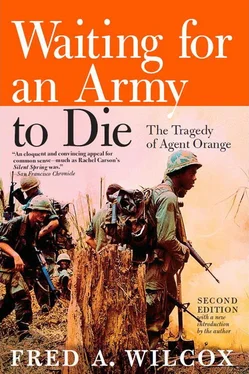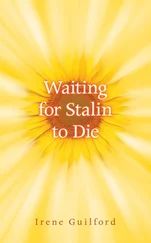After years of waiting, Vietnam veterans suffering from the effects of dioxin poisoning will still not be home free—even if Yannacone wins his case against the war contractor defendants. Because there is one more roadblock, one more “legal means” by which the chemical companies can attempt to prevent veterans from winning compensation for their injuries. The roadblock, says Keith Kavenagh, is the statute of limitations; and he believes it is quite possible that the war contractors will make use of this tactic to thwart, perhaps for the final time, veterans’ efforts to secure compensation for their injuries. In some states the statute of limitations is determined by the “time of injury.” This means that a Vietnam veteran exposed to dioxin in 1967 but suffering no ill effects until five or ten years later would be time-barred by that state’s three-year statute of limitations. In other states the statute of limitations begins only after discovery of one’s illness. Regardless of how much time has elapsed since the original exposure, a veteran can file a claim for compensation two or more years after he becomes ill. Because toxic chemicals often do not cause illness or death until years after the original exposure, veterans’ advocates argue that a statute of limitations based upon “time of injury” is inherently unjust. Responding to the veterans’ complaints, at least one state legislature, New York, has revised its statute of limitations law so that veterans will have two years from the time the law was passed, or twenty-four months after the discovery of their injury, to file a claim—depending on which time span happens to be longer. Should Yannacone win the suit against Dow and veterans then return to their local jurisdictions in order that the amount of their compensation can be determined, the issue of statute of limitations will, says Kavenagh, “loom large in the war contractors’ defense.”
Before Yannacone sent me upstairs to talk with Keith Kavenagh, I asked about the lawsuit he has pending against the Veterans Administration. Yannacone explained that Dow had actually told him about the kind of treatment, or lack of treatment, veterans were receiving at VA clinics.
“After the war the VA’s treatment of Vietnam veterans was so bad, Dow told us, that much of the illness and death and serious disability among Vietnam veterans might be due to the negligence, carelessness, and disregard of the Veterans Administration. We checked this out, and found it to be true, and that’s why we’re suing the VA. But it wasn’t our intention to sue them. We pleaded with the VA in private meeting after private meeting to please look at our victims, look at our data. And we asked the famous Dr. Paul Haber, the VA’s medical director, if he would consider our liver damage among Vietnam combat veterans. And he said, ‘I don’t see any cases of porphyria cutanea tarda.’ Now porphyria cutanea tarda is a terminal state of liver derangement where you turn jaundiced yellow, your eyeballs turn yellow, and you’re very, very sick. I said, ‘Doctor, I’m not interested in porphyria cutanea tarda. I’m interested in urinary porphyria derangements which are premonitory of the final stage. Let’s treat it before the guy dies!’ And he accused me of trying to practice medicine without a license. And I told him, I said, ‘I can’t believe that a physician at the head of the VA could be so stupid as to ignore the current scientific literature which I lay on the table in front of you, if you don’t have the wit and wisdom to read it in your own library.’ I said, ‘It’s not my quote. It’s from the literature. Here it is .’ And their reaction, by the way, was not to have physicians at this meeting, but there was Paul Haber and seven lawyers! I wasn’t suing the VA. That was February 1979, one month after we filed the lawsuit against Dow. But we were not suing the VA.”
Yannacone persisted in his efforts to avoid a lawsuit and to persuade the VA to recognize that Vietnam veterans needed help. He talked to Max Cleland in Los Angeles, and agreed on an arrangement to meet again with Haber and other “experts” to work out a cooperative program of dermatological investigation. The plan was to use the expertise of World War II dermatologists who knew “what jungle rot really was,” as well as industrial dermatologists from Dow and the workmen’s compensation board who could recognize chloracne. Clinics would then be established in all the major veterans hospitals throughout the country on a “road-show basis,” and Yannacone would produce fifty to one hundred of his clients at each of the clinics to determine whether they had “chloracne or just spots.” All this was agreed, says Yannacone, in the presence of cameramen from one of the major networks. But “in front of ABC-TV in the Patriot’s Hall in L.A., Max Cleland reneged on that agreement and said there was no evidence and they would not cooperate with the plaintiffs on the Agent Orange suit. They were not going to do anything to help a lawsuit, Cleland said, that they believed to be nothing more than a publicity stunt. Well, Dow sure as hell doesn’t think it’s a publicity stunt.”
Since he initiated the lawsuit against the VA, Yannacone says he has been placed under surveillance by the Justice Department, has received threats in writing, and has been threatened with an investigation to determine how he acquires his information on the medical effects of Agent Orange.
“They think I’ve got a mole in the VA. They demand to know who my sources are. But they know they have more information than I do. They have withheld. They are lying. They are killing veterans! ”
Yannacone realizes that he has been shouting. He sighs, shuffles a stack of papers on his desk and, it appears, waits for the jury to return with its verdict. I talk with Mrs. Yannacone for a few moments and then, accepting Yannacone’s offer of another cup of coffee, wander upstairs to find his law partner. Shortly, after two Carol Yannacone invites me to lunch, but before I leave his office Kavenagh and I talk briefly about Ireland. I explain that I once lived on an island off the coast of Connemara, and he tells me that he and his family toured the country in a rented car just the year before. Driving through County Wicklow they decided to take a road that led up a mountain. But after considerable winding the road simply narrowed and then disappeared altogether. They stopped and an elderly farmer emerged from a clump of trees and Kavenagh’s wife asked if he knew where the road “really went.” Without a moment’s hesitation, says Kavenagh, the old man winked and replied, “To eternity, ma’am, to eternity.”
A light snow is falling. Mrs. Yannacone is driving and Victor is pointing out the sights of the town. For a moment I have the urge to tell them Kavenagh’s story, but I assume they have already heard it, probably more than once. Then it occurs to me that the most remarkable thing about the Yannacones may not be that they have dedicated their lives to helping Vietnam veterans and their families, or that they spend every day working within the milieu of a monumental tragedy.
The surprising thing about the Yannacones, Keith Kavenagh, and others who work at the law office in Patchogue is that they can still laugh, tell a joke, and on occasion take an hour off to go to Fadeley’s Deli Pub, where they serve German beer, Guinness stout, and corned beef sandwiches with exotic names. We eat our lunch in one corner of the deli while Yannacone leafs through stacks of legal papers, handing Carol a number of medical reports, and smiling, it seems to me, in anticipation of victory against Dow et al.
Until a former Green Beret walking into his office complaining of symptoms that physicians call “exotic,” Dr. Ronald A. Codario had never heard of Agent Orange. “I don’t know how common my experience was,” says Codario, “but I went all through medical school and my training in internal medicine without ever hearing the word dioxin.” The veteran told Codario that since his return from Vietnam he had spent many hours each week practicing martial arts, becoming highly skilled in using vigorous physical exercises and meditation to control his emotions. But recently, he said, he had been losing the dexterity and speed that had taken him many long years of discipline and practice to develop. His muscular power seemed to decrease almost daily, and he suffered from headaches and numbness and was easily fatigued. But most bewildering, the self-discipline that had enabled him to survive Vietnam and the years following his discharge from the Special Forces seemed to be slipping away; he was afraid he was losing control. Although his training in martial arts helped to lessen his fear and enabled him at times to regain poise, he was disturbed because there seemed to be absolutely no reason for what was happening.
Читать дальше











